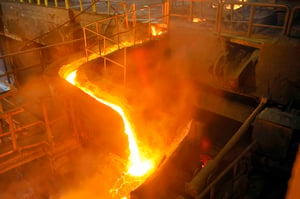 For heat treating applications, baskets have to be resilient against extreme temperatures—sometimes in excess of 1,200˚ F (649˚ C) or even 1,800˚ F (982˚ C). At these extreme temperatures, plastic baskets aren’t an option—most melt at temperatures below 400˚ F (204˚ C).
For heat treating applications, baskets have to be resilient against extreme temperatures—sometimes in excess of 1,200˚ F (649˚ C) or even 1,800˚ F (982˚ C). At these extreme temperatures, plastic baskets aren’t an option—most melt at temperatures below 400˚ F (204˚ C).
This is why most heat treatment baskets are made of metal. However, many metal alloys cannot withstand the temperature extremes involved in heat treating applications. Repeated exposure to temperatures in excess of 1,600˚ F (871˚ C) can cause many metals to suffer extreme oxidation, compromising the passive oxide layer that protects most stainless steels from corrosion. This, in turn, reduces the useful life of a heat treatment basket.
One solution to the challenge of creating a long-lasting custom wire basket for heat treatment applications is to use a specialized heat-resistant alloy, such as nickel alloy 600. What is nickel alloy 600? Why is it ideal for heat treating applications?
Here’s a quick overview of nickel alloy 600 and why it’s an ideal heat treatment basket material:
What is Nickel Alloy 600?
Nickel alloy 600, sometimes called just nickel 600, is a nickel-chromium alloy that is extremely resistant to oxidation at high temperatures—similar to Inconel® and some stainless steels. It is primarily composed of nickel (at least 72%, according to specs from United Performance Metals), with chromium (14-17%) and iron (6-10%) the next two largest ingredients.
The high nickel content of this alloy makes it extremely resistant to oxidation, even at high temperatures—preventing scaling and other issues commonly encountered in heat treating applications. Nickel 600 has a melting point between 2,470˚ F and 2,575˚ F (1,354˚ C and 1,413˚ C). It also has an ultimate tensile strength of 93 ksi at room temperature, and 15 ksi at 1,600˚ F (871˚ C).
Another benefit of the high nickel content in nickel 600 alloy is that it is generally resistant to corrosive environments—while the chromium content helps increase the alloy’s acid resistance.
All told, nickel 600 baskets are very resistant to high temperatures, corrosive environments, and acidic compounds while retaining relatively high tensile strength compared to most alloys at high temperatures.
Why Use Nickel 600 Baskets for Your Heat Treatment Applications?
So, why would you want to use nickel 600 alloy baskets instead of a stainless steel alloy such as grade 304 SS? The primary reason is that nickel 600 is far more resistant to oxidation from heat treat processes than 304 stainless steel is. While grade 304 stainless can take 1,600˚ F temperatures without melting and may even retain more tensile strength than nickel 600 at such temperatures (24 ksi vs 15 ksi), it isn’t as resilient to oxidation corrosion at those temperatures.
So, while the stainless steel would be able to carry more weight, it would start to corrode more quickly—reducing the useful life of the heat treat basket. This is why Marlin’s degreed engineers often recommend nickel 600 or similar high-temperature alloys for making heat treatment baskets over more common alloys such as 304 SS.
Nickel 600 is frequently used in vacuum heat treat furnaces with temperatures of up to 2,200˚ F (1,204˚ C), while temperatures closer to 2,300˚ F (1,260˚ C) may be pushing the performance envelope of the material.
When creating a custom wire basket for any manufacturing application, it’s important to have a thorough understanding of that application. This is why Marlin’s degreed engineers send out a custom, 10-point basket questionnaire to gather details about your manufacturing process before starting on the design of the basket. By doing so, Marlin’s degreed engineers can design for the specific performance factors involved in your manufacturing application—such as temperature extremes, chemical corrosives used, and physical impacts.
Do you need a custom wire basket for a heat treatment application right now? Get in touch with the masters of delivering “Quality, Engineered Quick®” at Marlin Steel.



.gif)


